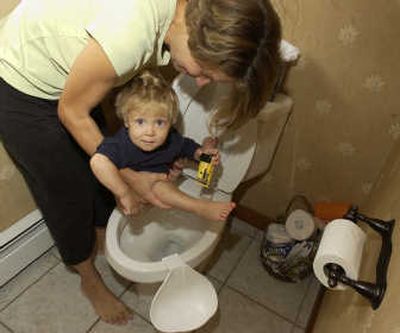More babies going ‘diaper-free’

SUTTON, Mass. – Thirteen-month-old Dominic Klatt stopped banging the furniture in the verandah, looked at his mother and clasped his hand around his wrist to signal that he needed to go to the bathroom.
His mother took the diaper-less tot to a tree in the yard, held him in a squatting position and made a gentle hissing sound – prompting the infant to relieve himself on cue.
Dominic is a product of a growing “diaper-free” movement founded on the belief that babies are born with an instinctive ability to signal when they have to answer nature’s call. Parents who practice “elimination communication” learn to read their children’s body language to help them recognize the need, and they mimic the sounds that a child associates with the bathroom.
Erinn Klatt began toilet training her son at birth and said he has not wet his bed since he was 6 months old.
Some parents and experts are skeptical.
“They teach them from birth? Oh, my God!” said 40-year-old Lisa Bolcato, as she held her 5-month-old daughter, Rose, at a park on Boston Common. “When you’re getting two hours of sleeps between feedings, I don’t think that you have the time to do it.”
Still, the practice is common in many parts of Africa and Asia where parents cannot afford diapers.
Experts at the Child Study Center at the University of Oklahoma Health Sciences Center say children younger than 12 months have no control over bladder or bowel movements and little control for six months after that.
But some parents begin going diaper-free at birth, and the infants can initiate bowel movements on cue as young as 3 to 4 months, said Elizabeth Parise, spokeswoman of DiaperFreeBaby.org.
Parents attempt the training to forge closer ties with their infants, reduce the environmental impact associated with diapers and avoid skin irritation, Parise said.